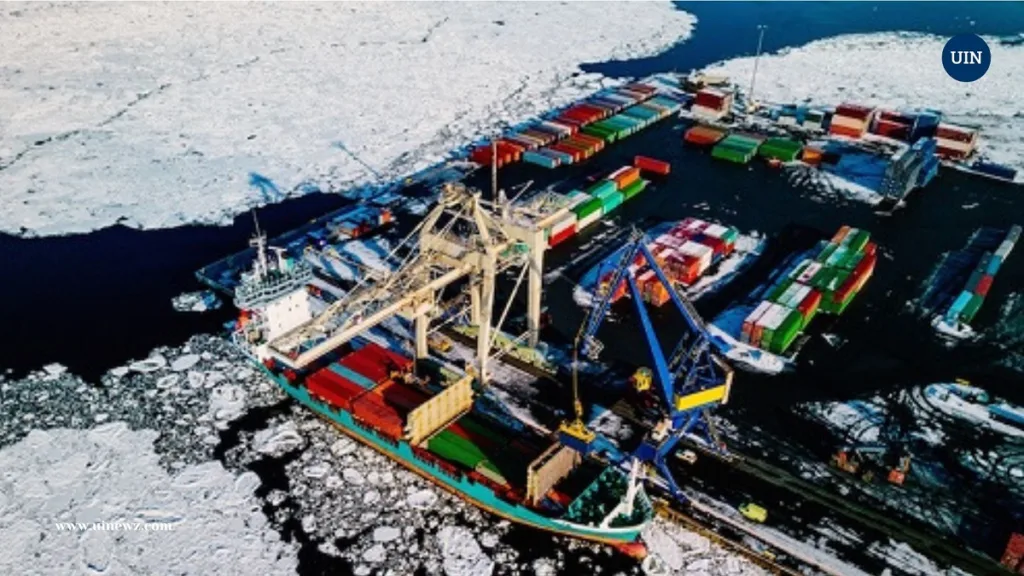In recent times, the Arctic region has garnered worldwide focus due to its changing environmental dynamics and economic prospects. Against this backdrop, India’s deliberate engagement in Arctic affairs and its growing role in the Northern Sea Route (NSR) have emerged as noteworthy elements that are molding the nation’s economic and geopolitical priorities on the international platform.
Table of Contents
Arctic’s Rising Importance for India
Murmansk, often hailed as the capital of the Arctic Region and the gateway to the Northern Sea Route, has become a focal point for India’s engagement. The Murmansk port, situated about 2,000 km northwest of Moscow, witnessed a remarkable trend: In the first seven months of 2023, India accounted for 35% of the eight million tonnes of cargo handled, signaling a growing footprint in the region.
The Arctic holds profound significance for India, spanning a range of factors that intersect with the nation’s strategic goals. At the forefront of these considerations lies the untapped potential of hydrocarbon reserves within the region. Projections indicate that the Arctic might encompass more than 40% of the worldwide oil and gas reserves, presenting India with a prospect to meet its energy security requirements. Rich deposits of minerals including coal, diamonds, and zinc align with India’s requirement for strategic resources.
However, India’s Arctic policy is underpinned by a commitment to UN Sustainable Development Goals, ensuring that economic development aligns with environmental sustainability.

Northern Sea Route: An Opportunity for Trade Efficiency
The Northern Sea Route (NSR) has garnered substantial attention as the shortest shipping route connecting Europe and the Asia-Pacific region. Stretching over 5,600 km and spanning the Barents, Kara, Laptev, and East Siberian Seas, the NSR offers a potential distance savings of up to 50% compared to traditional routes via the Suez or Panama Canals.
Russia’s pivotal role in ensuring navigability through its nuclear-powered icebreaker fleet has paved the way for increased maritime traffic. This development aligns seamlessly with India’s interests, which are fueled by various driving factors:
- Cargo Traffic Growth: India’s share in NSR cargo traffic witnessed remarkable growth, surging by approximately 73% during the period of 2018-2022. This aligns with the nation’s increasing imports of Russian Crude Oil and coal.
- Chennai-Vladivostok Maritime Corridor (CVMC): The CVMC project is a testament to India’s commitment to enhancing trade efficiency. This initiative shortens transport times and supports India’s trade-dependent economy.
- Geopolitical Balance: India’s interest in the NSR also stems from a strategic need to counterbalance the potential collective influence of China and Russia over the route.
India’s Arctic Engagement: A Historical and Research-Driven Approach
India’s link to the Arctic traces its origins to the Svalbard Treaty of 1920. From that time onwards, the country has been actively involved in conducting thorough scientific investigations and research within the Arctic domain. These efforts have been concentrated on a range of studies, encompassing atmospheric, biological, marine, hydrological, and glaciological realms. Initiatives like the Himadri research station and multi-sensor moored observatory underscore India’s commitment to understanding the Arctic’s dynamics.
Becoming an observer-state of the Arctic Council in 2013 solidified India’s presence in Arctic affairs, enabling it to actively contribute to discussions on climate change and resource management.
The Way Forward: Navigating Economic, Geopolitical, and Environmental Frontiers
India’s growing engagement in the Arctic, particularly its involvement in the NSR and research initiatives, underscores its strategic interests. The region’s vulnerability to climate change could impact India’s economic and water security, making the study of the Arctic critical for Indian scientists. Moreover, the abundance of natural resources in the Arctic aligns with India’s resource requirements.
As India continues to extend its influence in the Arctic region and enhance its participation in the NSR, it is poised to shape discussions on climate change, resource management, and trade efficiency on the global stage. The Arctic’s dynamic changes are thus shaping India’s economic and geopolitical interests, positioning the nation as a proactive stakeholder in this evolving and critical region.